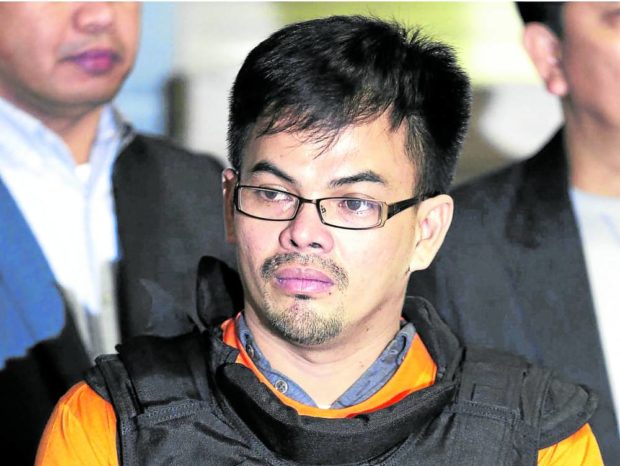Kerwin Espinosa acquitted by Makati court in drug case due to insufficient evidence

Kerwin Espinosa at Philippine National Police headquarters in Camp Crame, Quezon City in 2016. (INQUIRER FILE PHOTO / NINO JESUS ORBETA)
MANILA, Philippines – Rolan “Kerwin” Espinosa was acquitted of another drug charge by the Makati City Regional Trial Court.
In a 21-page ruling, Makati RTC Branch 65 granted the demurrer to evidence filed by Espinosa and former driver-bodyguard Marcelo Adorco.
Espinosa will remain detained despite the acquittal as he has two remaining drug-related cases before the Manila and Baybay City, Leyte courts.
He also has one illegal possession of firearms case pending in Manila.
Insufficient evidence
A demurrer to evidence is a motion to dismiss on the ground of insufficiency of evidence where a defendant cites that the evidence produced by the prosecution is insufficient to make out a case, whether true or not.
Once granted, the case will be dismissed, and it is tantamount to an acquittal. If denied, the trial will continue with the presentation of evidence by the accused.
“The Demurrer to Evidence filed by both accused is hereby granted. Accordingly, Rolan “Kerwin” Espinosa and Marcelo Adorco are hereby acquitted of the offense charged on reasonable doubt,” read the court’s ruling.
Espinosa and Adorco were accused of conspiracy to sell 80 kilograms of shabu on two instances–Feb. 16, 2013, and June 7, 2015.
Among the evidence presented by the prosecution are the testimonies of three police officers who testified for the prosecution.
Of the three, two testified, getting the testimony of Adorco. The other police officer was tasked to evaluate the evidence at hand and filed the case at the Department of Justice (DOJ), which led to its dismissal prompting the policeman to take another statement from Adorco.
Also included as evidence for the prosecution are Espinosa’s Judicial and Supplemental affidavit.
How the court ruled
The court said testimonies of the police officers “have no probative value since they have no personal knowledge of the facts constituting the offense charged.”
The court said testimonies of the police officers were merely based on what Adorco has said, making it hearsay “and may not be received as proof of the truth of what he has learned.
Adorco’s sworn statements, which were the basis of the police testimonies, the court said, also have no value because he was not presented in court to identify and affirm his affidavits in court. He was also not cross-examined based on what he said in the affidavits.
Since Adorco was not presented and cannot affirm and identify the affidavit, the court said, “the adverse party is deprived of the opportunity to cross-examine the affiants.”
“For this reason, affidavits are generally rejected for being hearsay unless the affiant themselves are placed on the witness stand to testify thereon. The rationale for this is respect for the accused’s constitutional right of confrontation or to meet the witnesses against him face-to-face,” the court explained.
The court also noted that Adorco also had no counsel when the police questioned him.
The court added that for Adorco’s supplemental affidavit, while a lawyer was present, no proof was presented that the lawyer did not confer with her client to determine if he was coerced or given advice that he had the right not to sign the affidavit.
The court said records showed that the lawyer was not chosen by Adorco but provided, and fees are paid for by the police, “thus putting into serious doubt her independence.”
The court added that there was also no record that witnesses were present when Adorco freely signed his third and fourth affidavits.
In Espinosa’s affidavit, the court said, “other than presenting the transcript of stenographic notes of the Senate hearing when Espinosa testified, the prosecution failed to show that such confession was made voluntarily.”
“As the prosecution failed to adduce evidence sufficient to overcome the burden of proving the guilt of both accused beyond a reasonable doubt, then the Demurrer to evidence ought to be granted,” the court said.